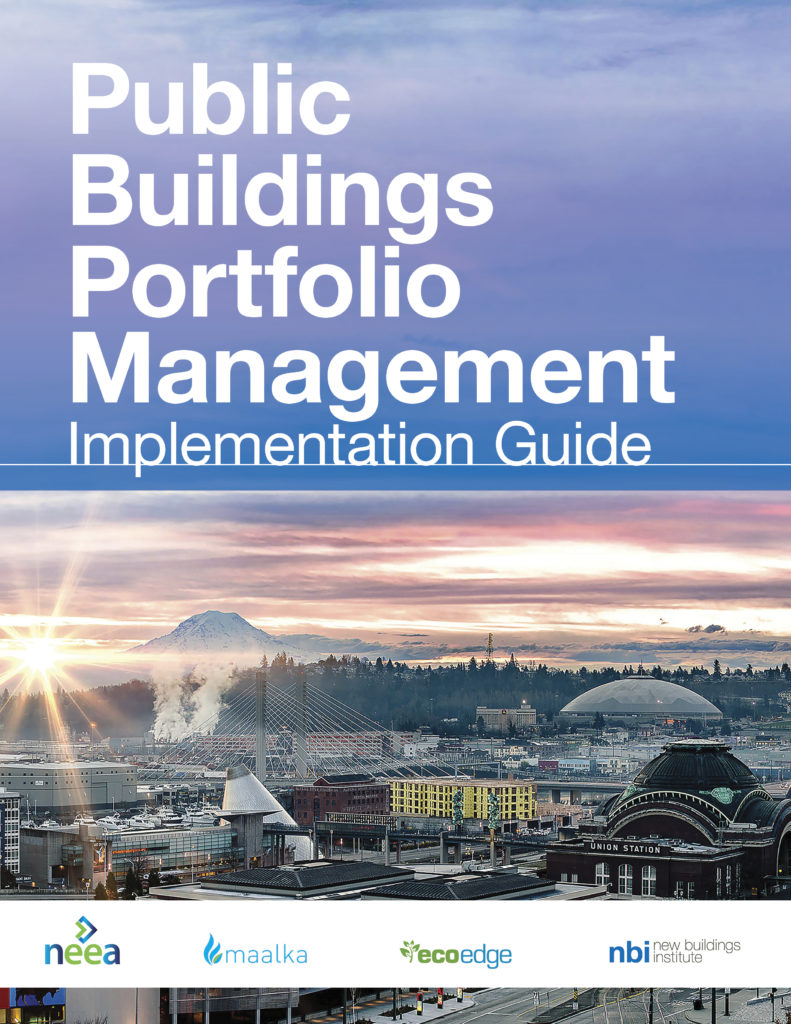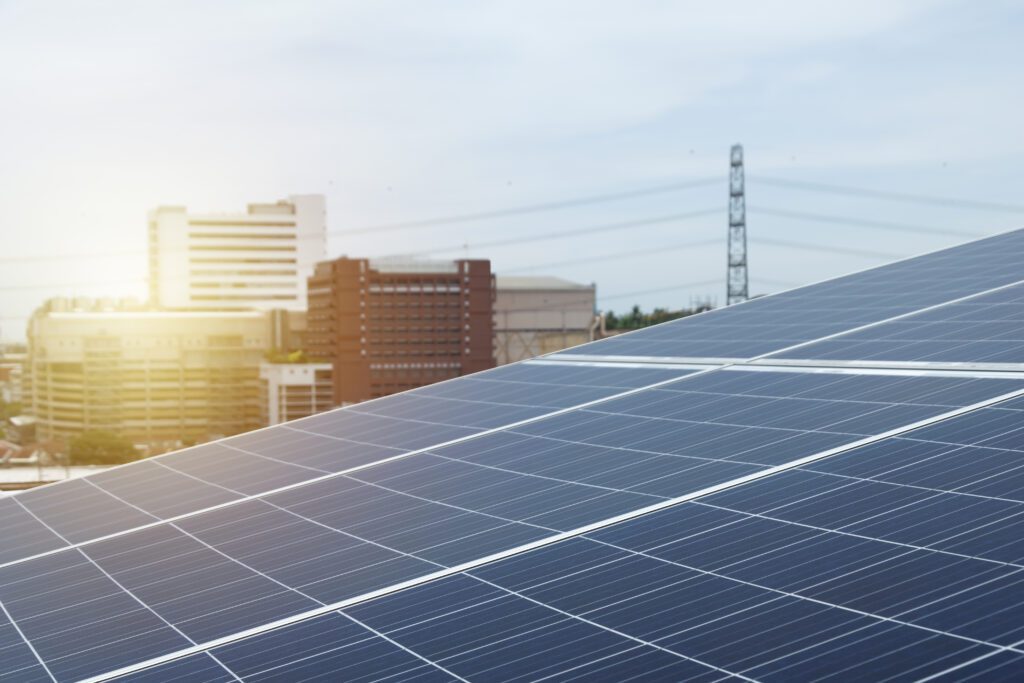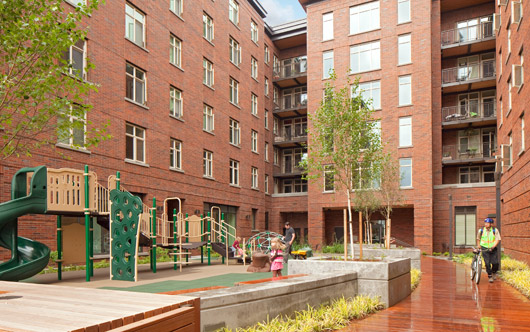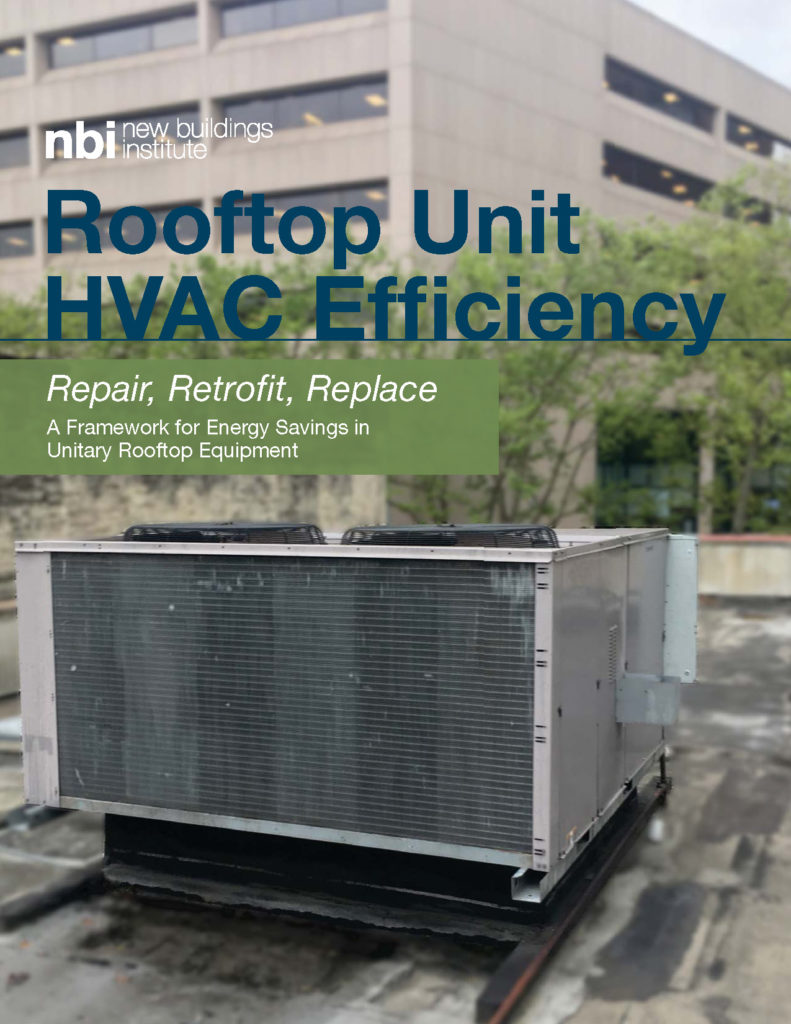New Construction
New construction projects stand out for their energy efficiency and healthy work spaces, they represent best-in-class commercial buildings. Check out our Tools & Guides.
Achieve advanced energy performance with the New Construction Guide
Read MoreCode & Policy
Aligning Utility Programs with Local Codes (Policy)
Codes & Policy / December 22, 2015
Bringing energy codes to market often involves a comprehensive approach that starts years before a code is adopted by a local jurisdiction. NBI provides technical assistance through each stage of code development. NBI aggregates technical information from existing high performance buildings. Observed trends...
Tools & Guides

Public Buildings Portfolio Management Implementation Guide
Guideline / January 29, 2018
The Public Buildings Portfolio Management Implementation Guide outlines a process to help staff engage stakeholders, set tangible goals, target opportunities, and develop a plan to achieve deep and ongoing energy reductions in public building portfolios. Public Buildings Portfolio Management coordinates…
Research
Sensitivity Analysis: Comparing the Impact of Design, Operation, and Tenant Behavior on Building Energy Performance
Report / July 27, 2011
This study compares the magnitude of energy impact that various design features, operations and tenant behaviors have on total building energy use. The findings of this study can help the building community begin to align their priorities with those building…
Focused Strategies
There are no codes & policy for New Construction. Please see our other codes & policy below.
2024 IECC Code Change Proposal Synopsis
Codes & Policy / February 14, 2022
Below you will find summaries of the draft code amendments and links to revision details that were submitted by NBI into the ICC process to advance the 2024 IECC. They are identified as Commercial or Residential and categorized by efficiency,...
Embodied Carbon
Codes & Policy / February 13, 2022
Building operations and construction-related activities are responsible for approximately 39% of humanity‘s global greenhouse gas (GHG) emissions. More than a fourth of those are embodied carbon emissions, those associated with the production of building materials, construction activities, operations, and end...
Building Performance Standards
Codes & Policy / January 21, 2022
Building performance standards (BPS) set targets for existing building energy performance and are one of the best tools we have for achieving deep energy savings and emissions reductions in existing buildings. They can be written to optimize the energy use...
Model and Base Energy Codes
Codes & Policy / July 16, 2021 / Energy Codes
For more than 20 years, NBI has been working with partners and within the code-making bodies to advance codes at the national, state, and local government levels. National model energy codes and standards like ASHRAE 90.1 and the International Energy Conservation Code (IECC) have...
Zero Cities Project
Codes & Policy / February 13, 2019 / Energy Codes
The Zero Cities Project is a three-year project supporting both cities and their most impacted communities* to co-develop and implement actionable and equitable roadmaps and policy strategies to achieve a zero-net-carbon (ZNC) building sector by 2050. Through a community collaboration...
Zero Energy/Carbon Codes
Codes & Policy / October 28, 2018 / Zero Net Energy (ZNE)
Building energy codes are playing an increasing in facilitating the move to ZE buildings. As advances in construction practices and building components and systems are proven out, communities are strengthening the building codes so that higher levels of building efficiency...
Stretch Codes (Advanced Codes)
Codes & Policy / October 15, 2018 / Energy Codes
New design and process strategies can be demonstrated through a variety of advanced code strategies. NBI builds market capacity for higher efficiency energy codes by encouraging the use of stretch codes (also referred to as reach codes). To support the...
Washington State Energy Code Roadmap to 2031
Codes & Policy / October 15, 2018 / Energy Codes
Many organizations and jurisdictions have adopted a range of building performance goals over the past decade that have significantly changed the conversation about energy codes and building energy performance. The primary policy driver for the Washington State Energy Code increases in...
Steps to Achieving Outcome-Based Energy Codes
Codes & Policy / December 22, 2015
Outcome-based energy codes, codes require that a number of policy, data and administration pieces be put in place.
zEPI
Codes & Policy / December 22, 2015
The 2015 International Green Construction Code (IgCC) includes many progressive measures that will improve the energy performance of buildings. One important provision describes the Zero Energy Performance Index (zEPI), which provides a scale for measuring commercial building energy performance. zEPI...
Zero Net Energy Policies
Codes & Policy / December 22, 2015
Policies and programs can dramatically change the landscape for Zero Net Energy (ZNE) buildings. There is burgeoning market interest in ZNE, and policies and programs can foster and grow that interest through leadership, direct support, and the reduction of risks and...
Aligning Utility Programs with Local Codes (Policy)
Codes & Policy / December 22, 2015
Bringing energy codes to market often involves a comprehensive approach that starts years before a code is adopted by a local jurisdiction. NBI provides technical assistance through each stage of code development. NBI aggregates technical information from existing high performance buildings. Observed trends...
Outcome-Based Energy Codes (Advanced Codes)
Codes & Policy / December 21, 2015
Our nation’s current energy codes include structural and enforcement characteristics that limit the ability to achieve significantly more energy savings without major changes. Current energy code strategies consider only a limited number of the factors that impact building energy performance. ...
Model Energy & Green Codes
Codes & Policy / December 19, 2015
NBI works collaboratively with a wide range of industry partners to bring model energy codes up to current market capabilities. Measures promoted by NBI include higher efficiency standards for equipment and advanced design strategies such as daylighting. Once adopted by states...
COMNET (Polcy)
Codes & Policy / December 19, 2015 / Policy
NBI manages the development of COMNET, a quality assurance initiative to standardize building energy modeling, by creating consistent baselines relative to various energy codes and standards. COMNET extends and supports existing systems for assessing and rating the energy efficiency of...
ResearchView All
Energy Performance of Commercial Buildings with Radiant Heating and Cooling
Report / August 10, 2017 / HVAC
This report is part of the California Energy Commission (CEC) EPIC project (EPIC-14-009), Optimizing Radiant Systems for Energy Efficiency and Comfort. The main goal of this research was to determine the building characteristics of projects with radiant heating and cooling…
Proposed Multifamily Building Section for the 2018 IECC
Document / October 16, 2015
NBI presented the first public “straw-man” of a proposed section for multifamily buildings in the 2018 International Energy Conservation Code (IECC) to the Department of Energy's Denver Energy Codes Stakeholder Meeting on October 13, 2015.
Assessment of Market-Ready Evaporative Technologies for HVAC Applications
Report / January 28, 2010
NBI completed a report on the range of evaporative, evaporative hybrid and evaporative condensing technologies for HVAC applications on behalf of Southern California Edison including: technologies, manufacturers, market applications and adoption factors surrounding evaporative approaches to cooling.
Events
There are no events for New Construction. Please see our other events below.

2024 Getting to Zero Forum
Event / May 21, 2024 - May 23, 2024
The Getting to Zero Forum is the premier event dedicated to building decarbonization. With a growing number of climate emergencies across the United States and around the world, there is no more important time than now for the Getting to…

Combi Heat Pump Webinar
Webinar / May 22, 2024 @ 10:00 am - 11:00 am PDT
This webinar will delve into combination space and water heating systems, also known as combi systems. While these systems seem promising, they present a level of complexity that raises questions about their practicality. The current market boasts standalone heat pump…

Both Sides of the Meter: GridOptimal Building Strategies (Part 1)
Event / June 6, 2024 @ 10:00 am - 11:00 am PDT
Buildings are at the center of our energy systems and account for over 70% of US electricity consumption. To succeed in decarbonizing our grid, buildings and the systems within buildings can be part of the solution. These two classes will…

Both Sides of the Meter: GridOptimal Building Strategies (Part 2)
Event / June 13, 2024 @ 10:00 am - 11:00 am PDT
Buildings are at the center of our energy systems and account for over 70% of US electricity consumption. To succeed in decarbonizing our grid, buildings and the systems within buildings can be part of the solution. These two classes will…
NewsView All
NBI Unveils New Multifamily Energy Guide
News / October 30, 2017
Published in EC&M: Multifamily buildings offer a largely untapped opportunity for improving energy efficiency, according to a recent report from the New Buildings Institute (NBI). Despite tremendous potential for savings, the organization explains why the multifamily market is hard to...
Smartglass International’s retrofit project with SPD-SmartGlass will protect priceless paintings at the University of Edinburgh and increases energy efficiency in buildings
News / September 23, 2016
Research Frontiers licensee Smartglass International addresses the long term savings that commercial organizations can realize when they install SPD-SmartGlass in their buildings. From 2016-2023, it is estimated that $960 billion will be invested to make existing buildings more environmentally friendly....
Danfoss’ Galyen: Incentives Will Boost Building Technology Development
News / September 24, 2015
On September 17, John Galyen, president, Danfoss North America, addressed the importance of taking a holistic approach to improving the efficiency of the U.S. commercial building stock as part of a broad objective to double energy productivity. Galyen was joined...
New Construction Guide endorsed by Architecture 2030 to meet the 2030 Challenge
News / June 16, 2015
The New Construction Guide has also been incorporated as the prescriptive path to comply with the energy prerequisites for both USGBC’s LEED v4 and the Northeast Collaborative for High Performance Schools standard. The guide has also been adopted as the...
New Construction Guide endorsed by Architecture 2030 to meet the 2030 Challenge
News / June 1, 2015
New Buildings Institute (NBI) and Architecture 2030 are excited to announce that Architecture 2030 has endorsed a prescriptive path to meet the current 2030 Challenge goal based on NBI’s New Construction® New Construction Guide. With this path, design teams now...
Blog

New Multifamily Guide Offers Solutions that Deliver Up to 25% Energy Savings
Post / October 10, 2017 / Energy Codes
Multifamily buildings pose a conundrum for advancing energy performance. As a building type, they are caught somewhere between commercial buildings and single-family residences – they are often constructed like commercial buildings, yet used as residential buildings. Energy-efficient technologies and design...
NBI Completes Study into Energy Performance of Commercial Buildings with Radiant Systems for Cooling and Heating
Post / August 10, 2017
During the renovation of the Edith Green Wendell Wyatt Federal Building, a variable air volume (VAV) system was replaced with a radiant design system. The design team included numerous CBE industry partners, including SERA Architects, Stantec, Interface Engineering, and Charles...
Best Practice Options for LED Lighting in Multifamily Offer Illumination Without Negative Impacts
Post / July 5, 2017 / Lighting
This material has been excerpted from the soon-to-be-released Multifamily Guide offering best practice design for high performance multifamily new construction projects. Stay tuned for more information on the Guide’s release. LED lighting had some of its earliest and broadest successes...
New Construction Guide and the Architecture 2030 Challenge
Post / July 1, 2015
In 2006, Architecture 2030 took a bold step: Challenge everyone involved with the built environment — designers, owners, government, utilities, operators and tenants, everyone — to reach for the goal of Zero Net Energy by 2030. Using the average performance...
Case StudiesView All
Savings Verification for Performance Contracting
Case Study / December 23, 2015
Washington’s Department of General Administration supervised an energy system retrofit of Spokane’s Westlake State Hospital and then was responsible for verifying the energy savings resulting from the improvements. However, when the hospital’s energy management system experienced a partial loss of…
The Runaway Building
Case Study / December 23, 2015
EZ Sim showed its versatility and its accuracy when analyzing a building with run away winter energy bills. While the building was initially modeled using a traditional engineering method, EZ Sim provided a quicker alternative to identify the nature of…
EZ SIM – Shows Bonus Energy Savings for County Office Building
Case Study / December 23, 2015
When a county building’s facility manager wanted to know if it was time to upgrade the building’s heat pumps, EZ Sim’s detective work helped to uncover more savings in more places than she bargained.
New England Regional Council of Carpenters
Case Study / December 23, 2015
The New England Regional Council of Carpenters (NERCC) represents 22,000 carpenters, pile drivers, shop and mill men, and floorcoverers working in the New England states.
Gibney Family Vision Center
Case Study / December 23, 2015
The Vermont Association for the Blind and Visually Impaired (VABVI), a non-profit organization founded in 1926, is the only private rehabilitation agency to offer free training, services and support to visually impaired Vermonters of all ages. VABVI offices are located…
Fidelity Bank
Case Study / December 23, 2015
Fidelity Bank is one of the oldest and continually growing independent, local community banks in Central Massachusetts. In January 2007, the bank opened its new Corporate Center and Branch in Leominster, Massachusetts. The four-story building includes office space as well…
Duxbury Bay Maritime School
Case Study / December 23, 2015
Serving more than 1,800 students annually, the not-for-profit Duxbury Bay Maritime School aims to connect the community through educational and recreational programs with its primary resource, Duxbury Bay.
Child and Family of Newport County
Case Study / December 23, 2015
Child and Family of Newport County (CF) is a nonprofit organization dedicated to strengthening families and communities through services such as preschool childcare, counseling, home care for the elderly and disabled, substance abuse education, home-based child welfare, transitional housing for…
Abraham Lincoln Elementary School
Case Study / December 23, 2015
In September 2010, the Abraham Lincoln Elementary School opened its new green building, ready to accommodate 600 students. This new building includes masonry and steel construction, a 3,300 square foot state-of-the-art library and media center, a 5,700 square foot gymnasium,…
New Construction Project Directory & Case Studies
Case Study / December 23, 2015
Information about New Construction projects that have utilized Core Performance are available here and, when available, include links to case studies or project profiles.
Tools & Guides
Quantifying the Water-Energy Nexus at the Building Project Scale
Online Tool / June 1, 2017 / Water-Energy Nexus
NBI has laid the groundwork to connect the water-energy nexus at the power plant with the energy consumed at the building level. With the support of existing research and funding from the Edwards Mother Earth Foundation, NBI has created a…
Daylighting Pattern Guide
Online Tool / December 20, 2015 / Daylighting
The Daylighting Pattern Guide is a free, interactive tool that helps design teams incorporate proven daylighting strategies into commercial building projects for substantial reductions in lighting power consumption and overall building energy use.

HVAC Primer
Guideline / December 19, 2015 / HVAC
This newly updated primer describes energy savings opportunities and context for packaged rooftop units (RTUs) for utility energy managers and their trade allies. RTUs are ubiquitous in commercial spaces but are also a difficult market to reach. Analysis shows many…
Core Performance Provides a Path to High Performance Buildings
Guideline / February 28, 2013
The Core Performance Guide is a prescriptive path that was first published in 2007. Following this building guidance will result in buildings that are more energy efficient than conventional buildings.
Plug Load Best Practices Guide
Guideline / July 17, 2012
The Plug Load Best Practices Guide outlines no-cost and low-cost measures for reducing the energy and costs associated with plug loads, or any device that is plugged into a building’s electrical system—think computers, printers and data servers. The guide, based…
Access the New Construction Toolbox
Online tools help design teams apply best practices to daylighting, electric lighting, HVAC, plug loads and more.
Access Now